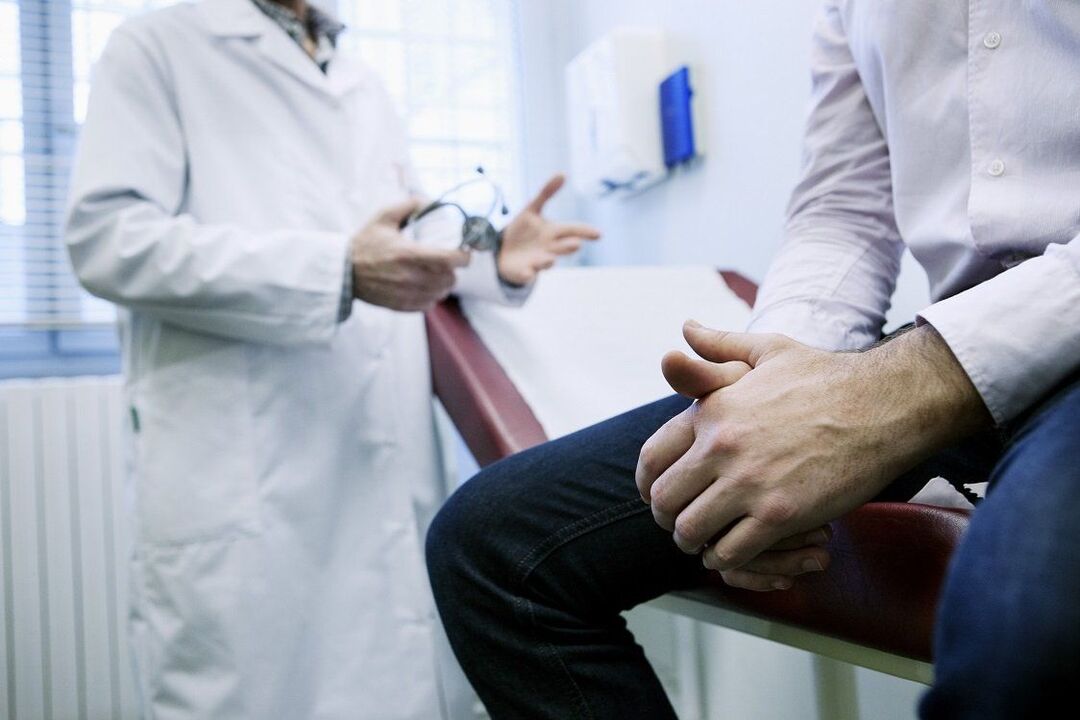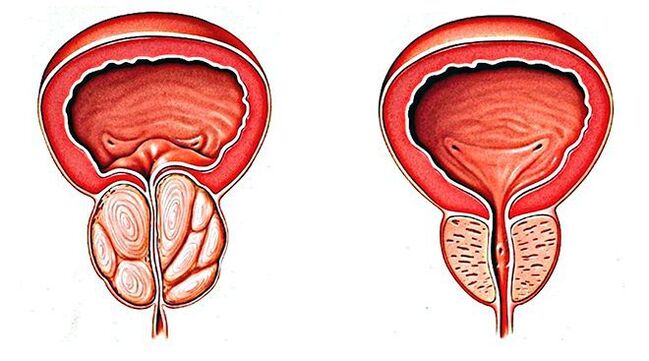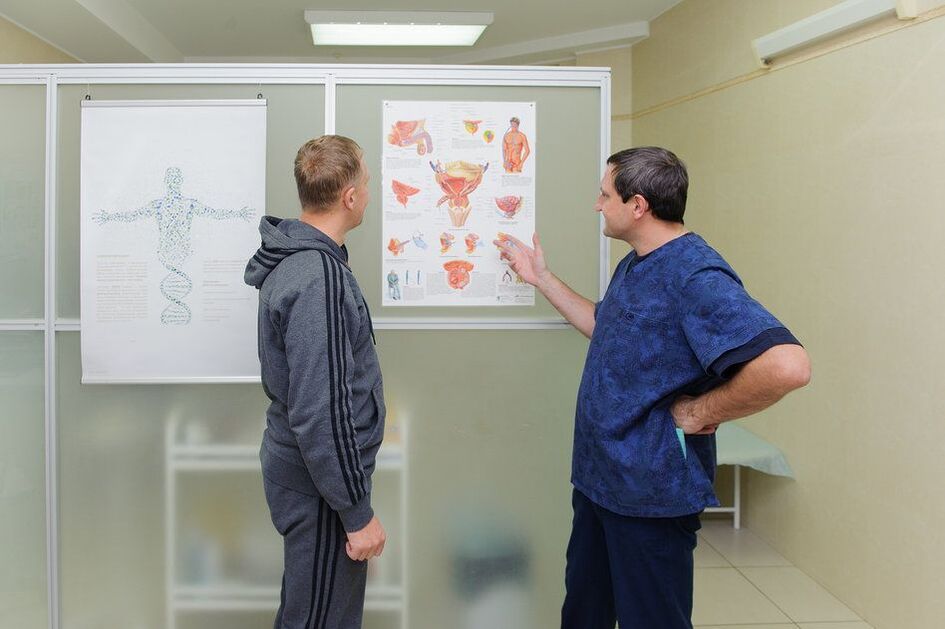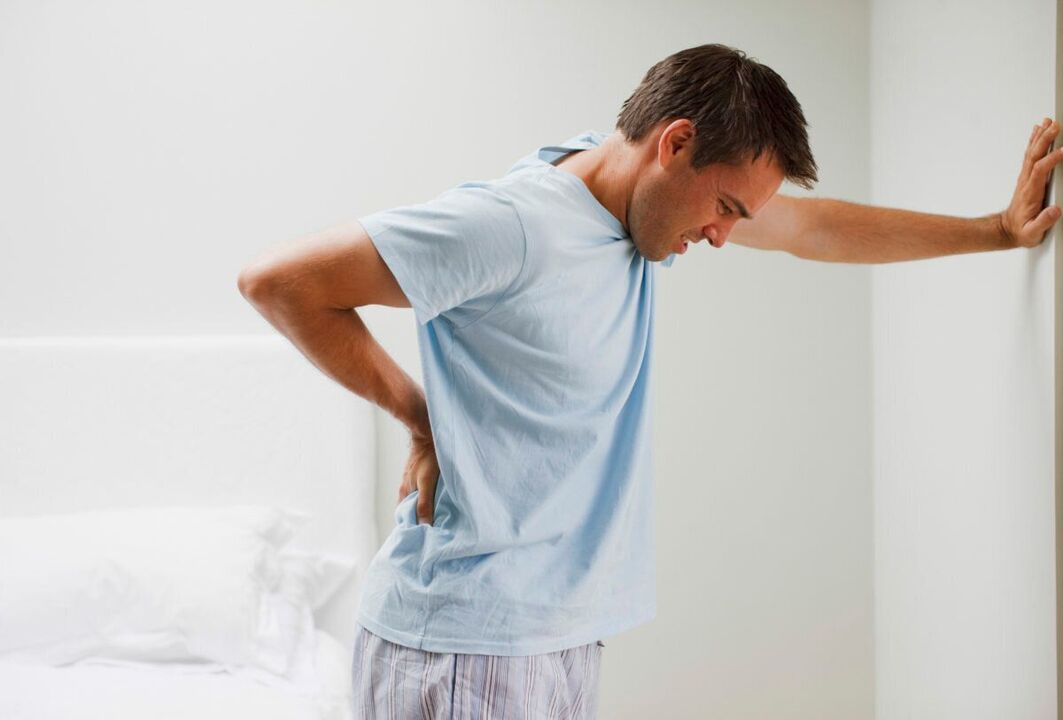Every year, more and more men face sexual problems due to inflammation of the prostate, an important organ of the male reproductive system responsible for reproductive function. Treatment of chronic prostatitis should begin as early as possible, the quality of future sexual life depends on this.

The Men's and Women's Health Clinic offers effective, cost-effective treatments for the male prostate at any stage of the disease. A qualified specialist will choose the optimal, most effective method that will help you get rid of this unpleasant problem forever. The main thing is not to delay seeing a doctor until later, this will not only save you money, but also shorten the healing time.
The modern clinic offers:
- comprehensive consultation with a urologist;
- Diagnosis using modern equipment;
- pass tests and perform analysis cheaply;
- Consulting support at every stage of treatment, from the first appointment until the patient fully recovers.
Even chronic progressive prostatitis can be treated! Make an appointment with a specialist using the convenient form on the website or make an inquiry by phone.
Chronic prostatitis, classification
Inflammation can be caused by bacteria, viruses, and other microorganisms; it can also be caused by hypothermia, bad habits, poor diet and a sedentary lifestyle.
Chronic prostatitis in men manifests itself in many different forms:
- Infectious- Develops due to harmful effects of microorganisms
- No infection or stasis- due to pelvic congestion (ejaculation stasis, prostatic secretion or venous blood)
In severe cases, when left untreated, the common form of the disease can develop into chronic stone-associated prostatitis. With this pathology, against the background of inflammation, stones will form in the gland itself and its ducts.
Asymptomatic prostatitis is characterized by the absence of symptoms and patient complaints and is detected only on examination.
The most common is the bacterial or stasis type, diagnosed in 95% of patients.
Causes of chronic prostatitis
Basic factors contributing to the development of the disease:
- lack of physical activity is a direct route to impaired blood supply to the pelvic organs due to obstruction;
- unhealthy diet, fatty foods, alcohol, smoking;
- Frequent restraint during sexual intercourse (for example, to avoid unwanted pregnancy by the partner) or interruption of it;
- Genitourinary system infections due to poor personal hygiene or infection through sexual partners;
- frequent hypothermia of the body;
- weakened immunity, constipation, inflammatory phenomena in the body, including diseases of the upper respiratory tract;
- endocrine diseases, hormonal imbalance;
- Surgery on the pelvic organs.
Although there are many different causes of chronic prostatitis, the symptoms all present in the same way. Usually, this is pain and discomfort in the lower abdomen.
Symptoms of chronic prostatitis
Signs of the disease may lessen or increase over time, indicating an inflammatory process. You should not expect that everything will go away or be treated on its own, the consequences will be sad - impotence, infertility, cancer.
A modern clinic or men's health care center specializing in the treatment of chronic prostatitis has helped hundreds of patients regain their sexual ability. It's important not to waste time and seek help if you're worried about the following symptoms:
- persistent pain in the perineum, spreading to the anus, lower back, inner thighs;
- erectile dysfunction;
- premature ejaculation, loss of sensitivity during and after sex;
- frequent urination (more than twice), especially at night;
- feeling of constantly empty bladder, "slow flow".
Depending on the stage of the disease and individual characteristics of the body, symptoms vary, but the pain constantly increases and becomes intense. With aggravation of the condition, painful sensations during ejaculation, weakening of erection and infertility are added.

Modern urology distinguishes four types of chronic prostatitis:
- acute bacterial - type I;
- chronic bacterial - type II;
- chronic bacterial - type III, (with inflammation - IIIa, without inflammation - IIIb);
- asymptomatic - type IV.
Methods of diagnosing chronic prostatitis
If characteristic symptoms are present, a urologist can easily make a diagnosis and conduct a standard survey and examination.
Laboratory diagnosis helps determine the presence of inflammation, the type of causative agent, and usually includes performing and examining blood, urine, and prostatic secretion tests.
It is also necessary to exclude the presence of prostate adenoma, cancer, tuberculosis, since these are diseases with similar symptoms.
Instrumental examination - ultrasound or TRUS - allows you to determine the changes that have occurred in the prostate, determine its size, density, presence of stones and tumors.
Only after an accurate diagnosis will the doctor decide how to treat chronic prostatitis in this particular case.
Treatment of chronic prostatitis
Depending on the physical characteristics of each patient and the cause of the disease, the treatment regimen for chronic prostatitis is developed individually.
Pharmacological treatment includes comprehensive use of analgesics, anti-inflammatory drugs and antibiotics in case of an infectious process. The most effective drugs to normalize flow and cleanse the prostate. In addition, it is necessary to take vitamins and immunomodulators to nourish damaged tissues. In case of problems with blood circulation, add varicose veins, anticoagulants, and blood thinners.
In a modern clinic, effective treatment of chronic prostatitis includes a unique method - lymphotropic therapy. This is the introduction of medication under the skin into areas near lymph vessels. At the same time, the absorption of the drug is significantly improved and its effect is enhanced, as it quickly spreads throughout the lymphatic system and from there reaches the desired organ or tissue.

You can improve the outflow of fluid from the prostate and normalize blood circulation in the pelvic organs by booking a massage for chronic prostatitis. The procedure is performed by an experienced urologist in the absence of contraindications. For men who are completely opposed to this method of treatment, it will be useful to perform the following exercises, they also have a positive effect on eliminating congestion in the pelvic area.
- Original location- Legs shoulder-width apart, hands clasped behind head. As you inhale, squat, spreading your knees to the sides as far as possible, and as you exhale, hold the starting position.
- Stand still, lift your legs one at a time with bent knees, trying to reach your chin.
- Sit on a small ball lying on the floor, stretch your legs, relax your arms, get into a comfortable position. Roll the ball with the gluteal muscles and genitals, making circular movements with them.
- Lay up, hold the ball between your bent knees. Inhale, tighten your knees and exhale, relax.
Long walks and cycling also stimulate blood flow to the pelvic organs and are recommended in complex therapy.
Additional physiotherapeutic procedures are carried out according to the doctor's recommendations:
- magnetic therapy;
- Phonetics;
- laser therapy;
- Electrical stimulation.
You can get rid of chronic prostatitis, or at least weaken the syndrome with the following proven folk methods.
- Raw pumpkin seeds or their oil. Just eat a small handful of peeled grains and use oil to mix salads;
- Drink unsweetened dried fruit (pear) decoction during the day;
- Green parsley, its seeds and juice are another folk remedy for prostatitis and impotence;
- At home, before going to bed, use rectal suppositories made from propolis and cocoa butter (sold at pharmacies) for a month.
If the treatment of chronic prostatitis does not bring the desired results and the patient's condition worsens, hospitalization is indicated. In rare cases, when the inflammation cannot be treated and becomes life-threatening, surgery is indicated.
Why is chronic prostatitis dangerous? Neglect of illness, confusion and fear when seeking help from a doctor can lead to serious complications. The inflammatory process eventually spreads to the urinary system and as a result, new diseases appear (cystitis, urethritis, kidney failure, cystitis). Long-term inflammation of the reproductive system can lead to the formation of a prostate adenoma, which at first is a benign tumor, but over time, without appropriate treatment, it can become malignant.
In addition to the above symptoms, complications of chronic prostatitis include infertility, impotence, complete depression, and loss of interest in life.
Don't bring yourself to this state! The cost of treatment in any case cannot be compared with the cost of your life. A good urologist will develop a treatment plan so you feel like you officially have a minor problem. How long the course will last depends on your wishes for recovery and timely contact with a specialist. Prognosis is favorable in most cases.
After treatment of chronic prostatitis, repeated tests are performed, the results of which confirm recovery (the level of leukocytes in the blood is normalized, the result is negative for the presence of systemicbacteria in prostatic fluid).
Recommended diet
It is important to drink enough liquid, this helps to eliminate pathogenic flora and also facilitates the process of urination.
Diet for chronic prostatitis excludes everything spicy, fried and salty. It is better to eliminate alcohol and sweet soda from your diet. You can drink dry wine only in small doses.

Food should be easy to digest - fiber, whole grains, seafood. Pumpkin seeds, sesame seeds, and flax seeds must be in the daily menu.
Prevention of chronic prostatitis
Following these simple rules will help protect men's health for many years and maintain it at the appropriate level:
- daily morning and evening cleaning procedures;
- having regular sex with a regular partner;
- Morning jogging or brisk walking for at least 10-15 minutes;
- refuse bad habits;
- annual preventative exam with a urologist.
Now you know what to do about chronic prostatitis. Be patient and follow all your doctor's recommendations. Do not stop the treatment you have started once your condition has improved so you don't have to start all over again later. Be healthy!


































